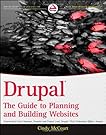After nine months of Drupal, it is time to review the diverse tools and methods I used to train myself, to assess what worked, and what didn't work, covering Drupal camps, textbooks, community, drupal.org, and tutorials.
Drupal Camps

I was fortunate to have had my first exposure to Drupal at the BADCamp, a drupal camp in Berkeley for the Bay Area. Through many stimulating talks, I got a good idea of the Drupal concepts. Subsequent camps were even more useful, because I could actually build on knowledge. BADCamp 2011 will be fabulous with up to 1000 participants and many parallel sessions. If you are in the area, don't forget to register early before it sells out!
Textbooks

Textbooks are good. I have several of them. They lie on my nightstand and diffuse their content into my dreams. I can't resist my other books (mysteries, novels), so the textbooks are getting a bit dusty. Some were too slow, some where too fast, some are good reading. In the end, I am happier with more interactive ways of learning.
The one book that makes good night-time reading is Cynthia McCourt's Drupal: The Guide to Planning and Building Websites, because outlines strategies on how to make customers happy by not just creating a beautiful and functional site, but also communicating the process in a structured way.
Community
The support forums, groups and mailing lists are a wonderful place to get your questions answered, but even more important to see, what questions are asked, and what answers are given, which gives me more complete knowledge of Drupal's capabilities, and implementation approaches. And it encourages me to read manual pages, and try to answer other users while learning a bit more. Participating in the community also enables the "lone" developers to get feedback: on their own work, on their expertise, on their approach to problem solving. It refines the thought processes, and often produces results by confessional debugging.
Drupal.org
The main source of information! You can find everything and anything on DO, you just need to figure out where. And when you see something unclear or outdated, you can fix it yourself!
Structured Approach
After using the quasi-random methods above to train myself, I realized that I needed a bit more structure, so that I wouldn't miss important steps, and learn how the pros are doing it. This is especially important when working alone, because of the absence of instant feedback. I tried a couple online training programs, and in the end have been most comfortable with the following two. They are not collecting dust (at least not too much), because I am actually working through the tutorials. They are useful, informative, and well structured.

Design-to-Theme's workbooks contain numerous procedures and recipes on site-building and theming in Drupal 7. I like especially the pdf format, which enables me to pick a certain functionality and plug it into a new site, without re-watching a video. I am actually not buying the individual workbooks, but participate in the Site Building Extravaganza. Many of the workbooks on this site are coming out of that one-year class.

Build-a-Module provides several video tutorial topics, covering the whole spectrum of Drupal 7 development. I am working my way through the module building section, which gives me a great foundation in coding standards, getting to know important APIs, and even assessing whether a new module is needed for a functionality. The videos are supplemented by an examples package, which enables me to implement the code, and play around with it. The longish tutorials are divided into 10min steps. In combination with working with actual code, this suits my habits better than other video tutorials.


Add new comment